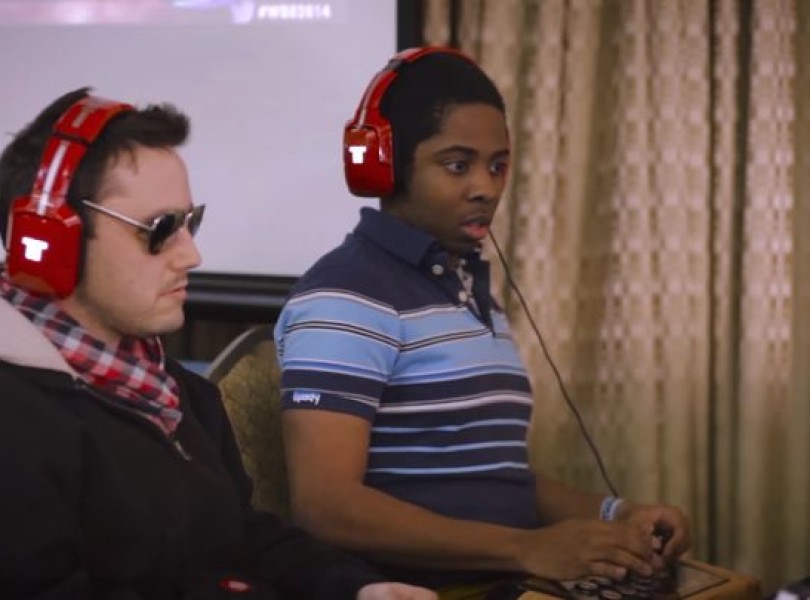A bit unfocused, but full of heart.
I’ll say this for FGC: Rise of the Fighting Game Community: it’s the cleanest, most well-produced documentary about the the fighting game community yet (and there have been a few). As an introduction to this particular nook of competitive gaming, FGC functions remarkably well, but on other levels it feels a bit safe, and perhaps too indecisive about what it wants its audience to take away from it.
We want to hear it.
Structurally, FGC is laid out in clear beats, the first of which is an introduction to fighting games for people who might not have even the first idea about them. Director Esteban Martinez has chosen all the right community members to carry this section, and the film as a whole. Guys like Seth Killian and James Chen bring both intimate understanding of fighting game mechanics, and an uncanny gift for communicating them to the uninitiated. Even for a life-long player, their eloquent insights have value, and their interviews provide a strong base for the film to build off of.
From there, FGC attempts to establish some narrative throughlines, the biggest of which is the path of Steve “Lord Knight” Barthelemy leading up to the Evolution Championship Series, which is the largest annual fighting game tournament in the world. Barthelemy is an unlikely, but welcome choice of player to focus on, seeing as his area of expertise is in games other than the more widely-known Street Fighters and Mortal Kombats. His presence as a major part of the story is indicative of a broader creative choice to include a wide, all-inclusive swath of games and players as opposed to focusing on the ones that enjoy the most mainstream penetration. It’s a savvy decision – one that lends an air of diversity and authenticity to the film.
Barthelemy is soft-spoken and likeable, but as someone who appreciates him as a player, I hoped to get more of an insight into his world than FGC really provided. We’re told his goal is to win Evo, but as you’d imagine, winning is a fairly common motivation in a competitive setting; it’s not the most interesting thing to hang a story on. Perhaps the bigger issue is that his story has to share screen time with a couple of others in addition to the fact that the ostensible “point” of the documentary is to chronicle the growth of the fighting game community. As FGC returns, time and again, to Barthelemy’s tournament progress, it only becomes harder to discern what the film is actually attempting to say.
Ironically, the characters FGC places less focus on end up having more satisfying stories. Joe “LI Joe” Ciaramelli talks about how the legendary New York arcade, Chinatown Fair, expanded his horizons, exposing him to foods and cultures he knew nothing about. His close friend and fellow tournament organizer, John Gallagher also gets some solid screen time, during which we get a fairly complete story of a young man finding friendship through a local arcade, taking his passion for games and turning it into a business venture, only to decide to leave it behind for other things. Gallagher’s chunk of FGC is the only part that truly succeeds in providing an emotional anchor for viewers to latch on to.
Presumably though, FGC is attempting to take a deep dive on how the competitive fighting game scene grew into what it is today, and it does that faithfully, if from an extremely zoomed-out perspective. It settles for telling the history of fighting games in broad strokes that the people who play them are already likely to know – again cementing the idea that FGC is actually aimed at people hearing about the scene for the very first time. At least it puts a nicely polished shoe on that first foot forward though; all the interviews, as well as the interstitial game and event footage look and sound pristine. It’s all shot on-location at major tournaments, or in the homes of the interviewees, which makes FGC feel like the genuine article.
And ultimately, it is. Martinez clearly loves and “gets” the fighting game community, and that shines through constantly, even when his film’s thesis struggles to. As it returned, one last time, to Barthelemy’s tournament run before rolling the credits, I didn’t feel like FGC had educated me or even given me a deeper appreciation of players I already know and love, but I did feel understood, which is certainly an accomplishment in and of itself.
I didn’t learn quite as much as I might have liked from FGC: Rise of the Fighting Game Community, but I still found it to be an enjoyable watch. Director Esteban Martinez clearly understands the community he’s showcasing, and he manages to shoot it all in a way that’s both intimate and clean-looking. A clearer sense of focus, and a deeper, more detailed look into the fighting game community’s history would have been appreciated, but as is, FGC is easy to recommend to people looking to get the jist of what makes the world of competitive fighting games interesting, while still being worth a watch for those firmly entrenched in it.





